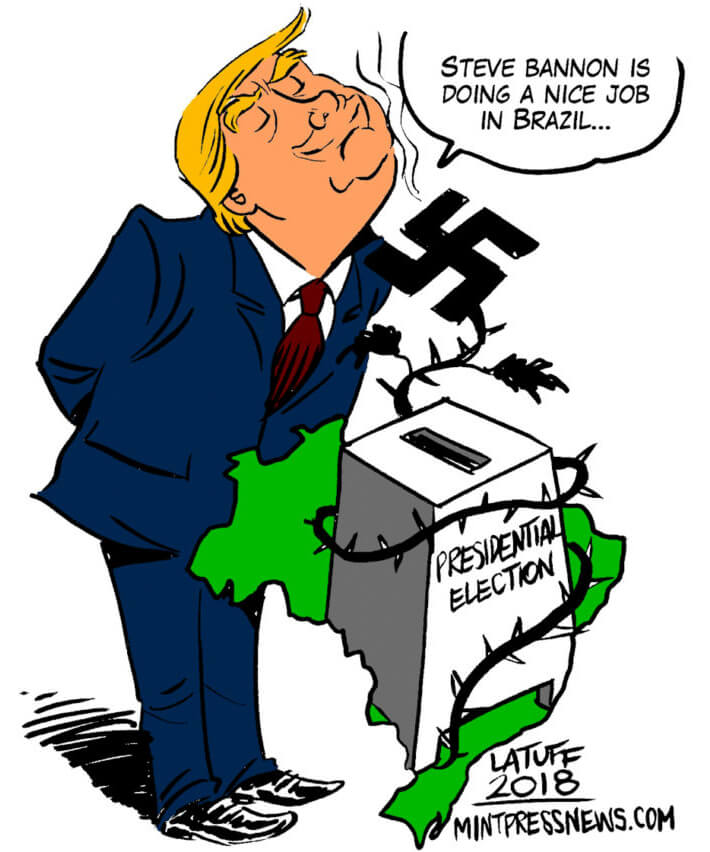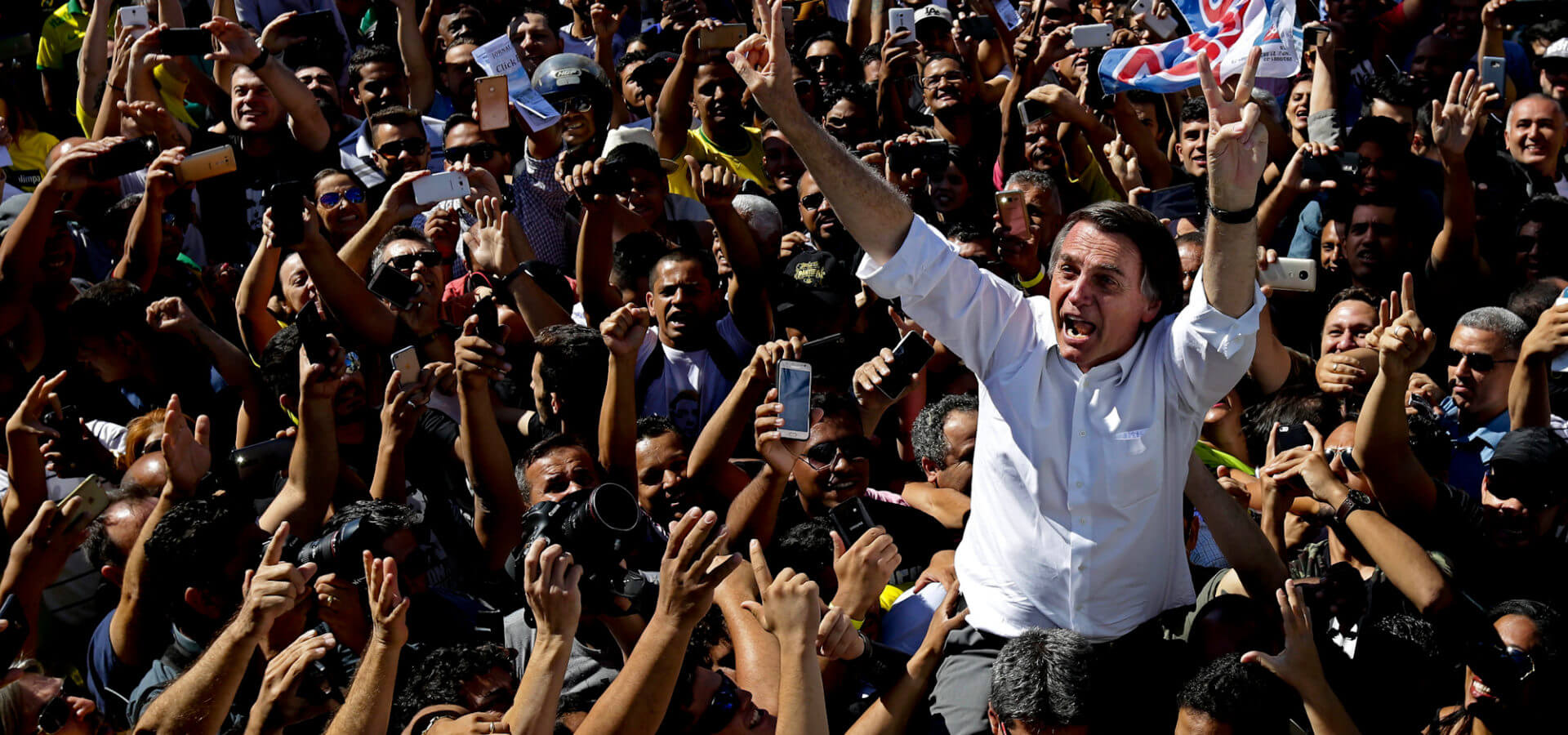BRASILIA, BRAZIL — The rise to prominence of Brazil’s far-right presidential candidate Jair Bolsonaro has given many in Brazil and abroad cause for concern. Bolsonaro – once considered a “fringe” politician – has publicly proposed bringing back elements of the country’s former military dictatorship, which he has often promoted over his three-decades-long career in Brazil’s Congress.
Despite the real concern that Bolsonaro’s potential victory in the upcoming Brazilian election could resurrect some of the country’s darkest days, international media outlets – particularly in the West – have widely likened Bolsonaro to U.S. President Donald Trump. Indeed, in recent years, Bolsonaro has promoted Trumpesque policies such as “draining the swamp,” crusading against corruption, and an end to the moderate welfare policies put in place by the center-left Workers’ Party (PT) under the tenures of former Brazilian presidents Dilma Rousseff and Luís Inácio Lula da Silva.
The comparisons between Trump and Bolsonaro have only grown after it was recently announced that Steve Bannon, the former head of Breitbart News and former chief advisor to Trump, will serve as an advisor to Bolsonaro’s presidential campaign. Bannon’s inclusion in Bolsonaro’s campaign was announced by his son, Eduardo Bolsonaro, who also confirmed that Bannon “had made himself available to help.” Eduardo Bolsonaro, who is also a congressman, further elaborated that Bannon’s involvement will involve “giving internet tips, analysis, interpreting data,” and similar types of assistance.
Bannon has long followed Bolsonaro’s political career but reportedly became enthusiastic about his prospects for Brazil’s presidency after seeing the candidate being swarmed by a crowd of supporters after arriving at a Brazilian airport.
Despite Bannon’s involvement in Bolsonaro’s campaign, observers of the upcoming Brazilian election should not be so quick to compare Bolsonaro to Donald Trump. Indeed, whereas Trump was a political newcomer, Bolsonaro has served over 30 years in the “swamp” he claims he wants to drain as a congressman. He also recently – in the last four years – became interested in fighting corruption, only after it embroiled the country’s prominent center-left Workers’ Party, long the object of Bolsonaro’s political ire.
For much of his political career, Bolsonaro was considered fringe – even for Brazil’s right – given his long-standing promotion of Brazil’s dictatorship, which controlled the country from 1964 to 1985. Indeed, Bolsonaro has called the 1964 coup a “defense of democracy.” In an infamous interview in 1999, Bolsonaro declared that the country’s military dictatorship had failed to “finish its job,” adding that “you are not going to change anything through voting; … you’ll only change things by having a civil war and doing the work the military regime didn’t do.”
According to Bolsonaro, the work the military dictatorship “didn’t do” is the “killing [of] 30,000, starting with FHC [former Brazilian President Fernando Henrique Cardoso].” “If a few innocent people die, that’s alright,” Bolsonaro concluded.
Trumpism on steroids
Though — like Trump — Bolsonaro has long vowed to defend Brazil against “internal enemies” such as “communists,” “Indians,” and “faggots,” Bolsonaro is different from Trump in that – instead of planning to build a wall or enact an immigration ban – Bolsonaro believes in using military and police violence to purge Brazil of “undesirables.”

Even after reinventing himself as an anti-corruption crusader, Bolsonaro’s promotion of Brazil’s past dictatorship and its violent tactics has shone through with stunning regularity. For instance, while voting to impeach Dilma Rousseff in 2016, Bolsonaro announced his vote in favor of impeachment by stating:
They lost in ‘64, they lost now in 2016 … against Communism, for our freedom … in memory of Colonel Carlos Alberto Brilhante Ustra, the terror of Dilma Rousseff … for our Armed Forces, I vote yea.”
Carlos Ustra was a colonel in the Brazilian Army and the head of the DOI-CODI, a well-known torture center that, during Ustra’s tenure, tortured more than 300 people, including pregnant women and children as young as five.
As Frederico Freitas recently wrote in Current Affairs, Brazil’s seemingly surprising embrace of a far-right would-be mass murderer is the sad result of Brazil’s long failure to grapple with the dark past of the dictatorship. Freitas argues:
Brazil has never fully reckoned with the political crimes of its military dictatorship. This void of justice and consequence has allowed the right wing to return and thrive. This is the regime in which a man like Bolsonaro can build a fatalist political campaign that presents a return to the ‘years of lead’ as the only solution for the current Brazilian crisis.”
Though Bolsonaro’s appeals to “drain the swamp,” his shallow nationalism targeting “internal enemies,” and his new link to Steve Bannon evoke comparisons between him and Trump, such comparisons are misleading. They glibly write off a future Bolsonaro-led Brazil as being like a Trump-led United States, when the Brazilian edition is set to be much worse.
Top Photo | National Social Liberal Party presidential candidate Jair Bolsonaro greets supporters as he gets a shoulder ride from a member of his security detail, in Brasilia’s Ceilandia neighborhood, Brazil, Sept. 5, 2018. Eraldo Peres | AP
Whitney Webb is a staff writer for MintPress News and a contributor to Ben Swann’s Truth in Media. Her work has appeared on Global Research, the Ron Paul Institute and 21st Century Wire, among others. She has also made radio and TV appearances on RT and Sputnik. She currently lives with her family in southern Chile.


